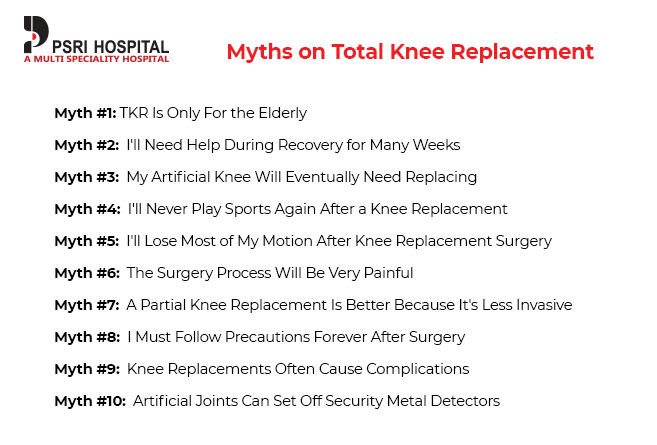Myths on Total Knee Replacement

Total knee replacement (TKR) surgery is a common procedure done to relieve severe pain and disability from knee arthritis. During this surgery, damaged cartilage and bone are removed from the knee joint and replaced with a metal and plastic implant.
As with any major surgery, there are many misconceptions and myths surrounding TKR. It’s important to separate fact from fiction when considering this procedure. Here, we explore some common myths and present the facts on total knee replacement.

Myth #1: TKR Is Only For the Elderly
Fact: While most TKR patients are over age 60, the surgery can benefit younger patients too. If you have chronic knee pain from arthritis that has not responded to more conservative treatments, TKR may help reduce pain and restore function regardless of age. Many active adults in their 40s and 50s now opt for knee replacement so they can remain active.
Myth #2: I’ll Need Help During Recovery for Many Weeks
Fact: Most patients are able to walk with support just hours after surgery. With dedicated recovery, most people can resume driving and light activities after just 2-4 weeks, along with some assistance with things like lifting and housework. Complete recovery takes about 3-6 months, but many patients feel dramatically better in just a few weeks.
Myth #3: My Artificial Knee Will Eventually Need Replacing
Fact: Today’s knee implants are extremely durable. More than 90% of implants last 25 years or more. For younger patients, there is a chance they will outlive their first artificial knee. However, revision surgery to replace a worn implant is far less complicated than the original operation.
Myth #4: I’ll Never Play Sports Again After a Knee Replacement
Fact: While high-impact activities like running are not recommended, most patients can return to low-impact sports like walking, swimming, or golfing after recovery. Your surgeon from the best hospital in Delhi will guide you on appropriate activities post-surgery. But TKR may allow you to be more active than before!
Myth #5: I’ll Lose Most of My Motion After Knee Replacement Surgery
Fact: New surgical techniques and implant materials allow maximum preservation of motion. Patients are encouraged to begin range-of-motion exercises immediately after surgery to help the healing process. With rehab, most individuals regain a range of motion similar to a healthy knee.
Myth #6: The Surgery Process Will Be Very Painful
Fact: Virtually all patients report significant discomfort after surgery. However, in the knee replacement surgery in Delhi NCR, you’ll be given anesthesia and medication during the procedure to keep the pain controlled afterward. Most people describe the pain as temporary soreness rather than extreme pain. Within 6-12 weeks, discomfort levels drop dramatically.
Myth #7: A Partial Knee Replacement Is Better Because It’s Less Invasive
Fact: For some patients with damage limited to just one knee compartment, a partial (or unicompartmental) replacement is appropriate. For others with multi-compartment arthritis, a full replacement is necessary. Orthopedic specialists determine the best option given your unique situation. Less invasive does not always equal better results.
Myth #8: I Must Follow Precautions Forever After Surgery
Fact: Another important facts on total knee replacement that you should consider is this. Initially post-op, precautions protect healing tissue so implants adhere correctly. But these precautions are temporary. Within 6-12 weeks of surgery, your knee should be healed enough to resume most normal activities comfortably without worry of complications.
Myth #9: Knee Replacements Often Cause Complications
Fact: All surgeries carry some risks. However, major complications from TKR are relatively rare in otherwise healthy patients. Blood clots, infections, chronic pain, and implant failure occur in less than 2-4% of knee replacement cases when performed by an experienced surgeon. Avoiding complications is a top priority.
Myth #10: Artificial Joints Can Set Off Security Metal Detectors
Fact: Knee replacement components are made from metals, and plastics are chosen partially due to their biomechanical properties rather than magnetic or electrically conductive qualities. Joint implants typically do not activate security screening equipment at airports or facilities. No worries there!
Conclusion
Understand the facts around risks, limitations, and expected outcomes before considering total knee replacement. Separate myth from reality so you can make the most informed decision and optimize your experience if you choose this option. With realistic expectations, appropriate patient selection, and skilled surgery, most patients experience excellent pain relief and restored function from knee replacement that lasts decades.
So, if you are looking for the best knee replacement surgery in Delhi NCR, PSRI Hospital is here to help you. Known as one of the best hospital in Delhi, we have an expert team of doctors who can perform successful knee replacement surgery. Book an appointment today to learn more about treatment and knee replacement surgery cost in Delhi.

 Book An Appointment
Book An Appointment Virtual Consultation
Virtual Consultation





